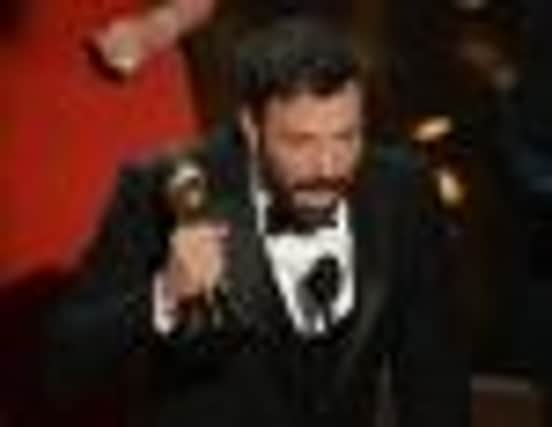Comment: most democratic Oscars in recent memory


He was referring to Ben Affleck’s absence from the list of nominees for best director, yet by the time the ceremony drew to a close (some three-and-a-half hours later), the Academy’s oversight seemed more embarrassing than Jennifer Lawrence falling flat on her face. Affleck’s third film as a director was named best picture – making it the first such winner since the dismal Driving Miss Daisy in 1989 not to have a concurrent nomination for its director.
Producer Grant Heslov, for one, couldn’t resist making a veiled reference to the slight in his speech. Paying tribute to Affleck on behalf of himself and producing partner George Clooney, he practically spelled out Affleck’s job title when he described him as “our co-producer. And our director!”
Advertisement
Hide AdNot that Affleck was denied a gold statuette. As one of the film’s producers he got to share in its glory, yet the lack of acknowledgment for his fine directorial work on the film was strange considering the only things the Academy of Motion Picture Arts and Sciences tends to love more than actors-turned-directors (see past winners such as Robert Redford, Warren Beatty, Clint Eastwood, Mel Gibson and Kevin Costner) are films that show their industry in a good light. Argo certainly did the latter. Indeed that’s probably what gave it the edge over some of its competition. Less controversial that Zero Dark Thirty, more vibrant than Lincoln, it was a smart, politically engaged film in which Hollywood’s normally detrimental propensity for making stuff up became a heroic and essential part of the plot.
But if Argo won the big prize, it didn’t win the most prizes. Just pipping its three awards was Life of Pi, which picked up four Oscars, including best director for Ang Lee, making it the second time in his career (after Brokeback Mountain) that he’s won the prestigious award without his film winning best picture. Elsewhere Daniel Day Lewis’s win for Lincoln made him the first actor in the awards’ history to win the best actor Oscar three times. That didn’t stop the former Oscar front-runner being one of the night’s biggest losers. Lincoln secured just two awards from its 12 nominations.
Mercifully, the multiple musical interludes – which for some reason included an anniversary tribute to Chicago’s what-were-they-thinking? Oscar sweep a decade ago – were not the portents of doom they could have been. Aside from Anne Hathaway’s much-predicted best supporting actress win, Les Misérables barely figured, although the cast did, unfortunately, invade the stage at one point for an extended medley in which the home crowd actually cheered on Russell Crowe. Apparently without irony.
On the home front (kind of), Brave’s win for animated feature finally gave co-director Brenda Chapman the recognition she deserved after fellow recipient Mark Andrews replaced her on the film. It was an acknowledgment that tied in neatly with the emerging theme of this year’s ceremony. No one film dominated; there were no genuine surprises or upsets, and all of the front-runners (among them Django Unchained and Silver Linings Playbook) scored at least one major award each. Indeed even Zero Dark Thirty sneaked an Oscar by tying with Skyfall for best sound editing. All of which made the bizarre decision to get First Lady Michelle Obama to announce the best picture winner live from the White House oddly appropriate: the 85th Academy Awards were the most democratic in recent memory.